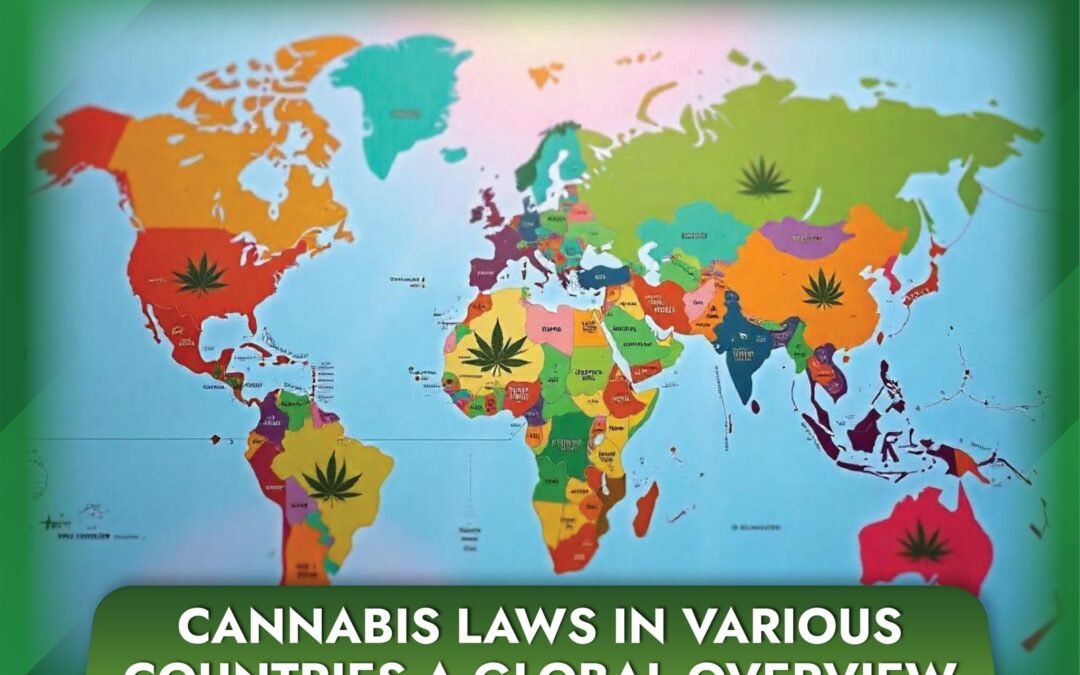Cannabis legalization has been a topic of significant debate in recent years, with countries around the world adopting vastly different approaches to its use and regulation. Some countries have embraced full legalization for both medical and recreational purposes, while others maintain strict prohibitions. This article explores the cannabis laws in seven countries that have taken various approaches to regulating cannabis: Canada, the United States, Uruguay, the Netherlands, Thailand, Germany, and Spain.
Canada: Full Legalization for Medical and Recreational Use
Canada became one of the first major countries to fully legalize cannabis for both medical and recreational use in 2018. The law allows adults (aged 18 or 19 depending on the province) to possess up to 30 grams of dried cannabis for personal use and cultivate up to four plants per household. Canada’s cannabis regulations are designed to ensure product safety, prevent underage consumption, and reduce the black market.
The legalization has also paved the way for a booming cannabis industry. According to reports, the legal cannabis market in Canada generated over $3 billion in 2021. Despite its success, challenges remain, such as issues related to impaired driving and inconsistencies in provincial regulations.
United States: State-by-State Legalization, Federal Prohibition
The legal status of cannabis in the United States is complex. While cannabis remains illegal at the federal level, many states have taken it upon themselves to legalize its use. As of 2024, 23 states, including California, Colorado, and New York, have legalized both medical and recreational cannabis use. Several other states allow medical use only, while some still maintain full prohibition.
Federal illegality presents challenges, such as restrictions on banking and interstate commerce for cannabis businesses, despite their operations being legal under state law. Furthermore, cannabis remains a Schedule I drug under the Controlled Substances Act, meaning the federal government views it as having no medical value and a high potential for abuse.
Uruguay: The First Country to Fully Legalize Cannabis
Uruguay became the first country in the world to fully legalize cannabis in 2013. Under Uruguayan law, adults over the age of 18 can purchase cannabis from licensed pharmacies, grow up to six plants at home, or join a cannabis club to cultivate the plant collectively. The government tightly regulates the cannabis market, including price controls to prevent black market competition.
Uruguay’s cannabis model focuses on harm reduction, public health, and reducing the influence of illegal drug trafficking. Since its implementation, the country has not experienced a significant increase in cannabis use, a key concern of critics.
Netherlands: Cannabis “Tolerance” Policy
The Netherlands is famous for its cannabis “tolerance” policy. Although cannabis remains technically illegal, the government allows the sale of small amounts (up to 5 grams) in licensed coffee shops. This policy has been in place since the 1970s, to separate the cannabis market from harder drugs.
The Dutch approach focuses on public health and reducing the harms associated with drug use. Despite this tolerant attitude, there are still strict rules in place: the sale of cannabis outside of coffee shops, large-scale production, and possession of more than 5 grams can still lead to legal consequences.
Thailand: Medical Use Legalized, Recreational Use Restricted
Thailand made headlines in 2018 by becoming the first Southeast Asian country to legalize medical cannabis. The move was a significant shift in a region known for its harsh drug laws. Under Thailand’s current laws, cannabis can be cultivated for medical purposes, and licensed practitioners can prescribe cannabis-based treatments.
While medical cannabis is legal, the recreational use of cannabis remains a gray area. Thailand has decriminalized the possession of cannabis for personal use but prohibits its recreational consumption in public spaces. The Thai government also hopes to position itself as a leader in the global cannabis market, particularly for medicinal purposes and research.
Germany: Medical Cannabis Legal, Recreational Legalization in Progress
In Germany, medical cannabis has been legal since 2017. Patients with serious medical conditions, such as chronic pain or multiple sclerosis, can obtain cannabis through a doctor’s prescription. The German government has tightly regulated the production and distribution of medical cannabis, ensuring that it meets pharmaceutical standards.
Germany is now in the process of legalizing recreational cannabis. In 2021, the newly elected coalition government announced its intention to create a regulated market for recreational cannabis, making it the first major European economy to take this step. The proposed legislation would allow adults to purchase cannabis from licensed shops, and cultivation would be allowed under certain conditions.
Spain: Private Use and Cultivation Allowed, Public Sale Prohibited
Spain has adopted a unique approach to cannabis regulation. While the sale and possession of cannabis in public remain illegal, personal use and cultivation in private spaces are decriminalized. Cannabis social clubs, where members collectively grow and consume cannabis in a private setting, have become increasingly popular.
Spain’s approach is rooted in the idea that private activities, as long as they do not harm others, should not be subject to state intervention. The cannabis clubs operate in a legal gray area, and the sale of cannabis remains illegal, even though the clubs are tolerated in practice.
Conclusion
The global landscape of cannabis laws is rapidly evolving. Countries like Canada and Uruguay have embraced full legalization, while others, such as Germany and Thailand, are exploring ways to regulate cannabis for medical and, in some cases, recreational use. In contrast, countries like the Netherlands and Spain continue to navigate legal gray areas, focusing on harm reduction and private consumption.
As public attitudes toward cannabis continue to shift, more countries will likely follow suit, liberalizing their cannabis laws in the coming years. However, the regulatory frameworks and challenges faced by each country will remain diverse, influenced by local culture, public health considerations, and economic factors.
Understanding these differences is crucial for anyone interested in the global cannabis industry or curious about how different societies are managing the complexities of cannabis legalization.

